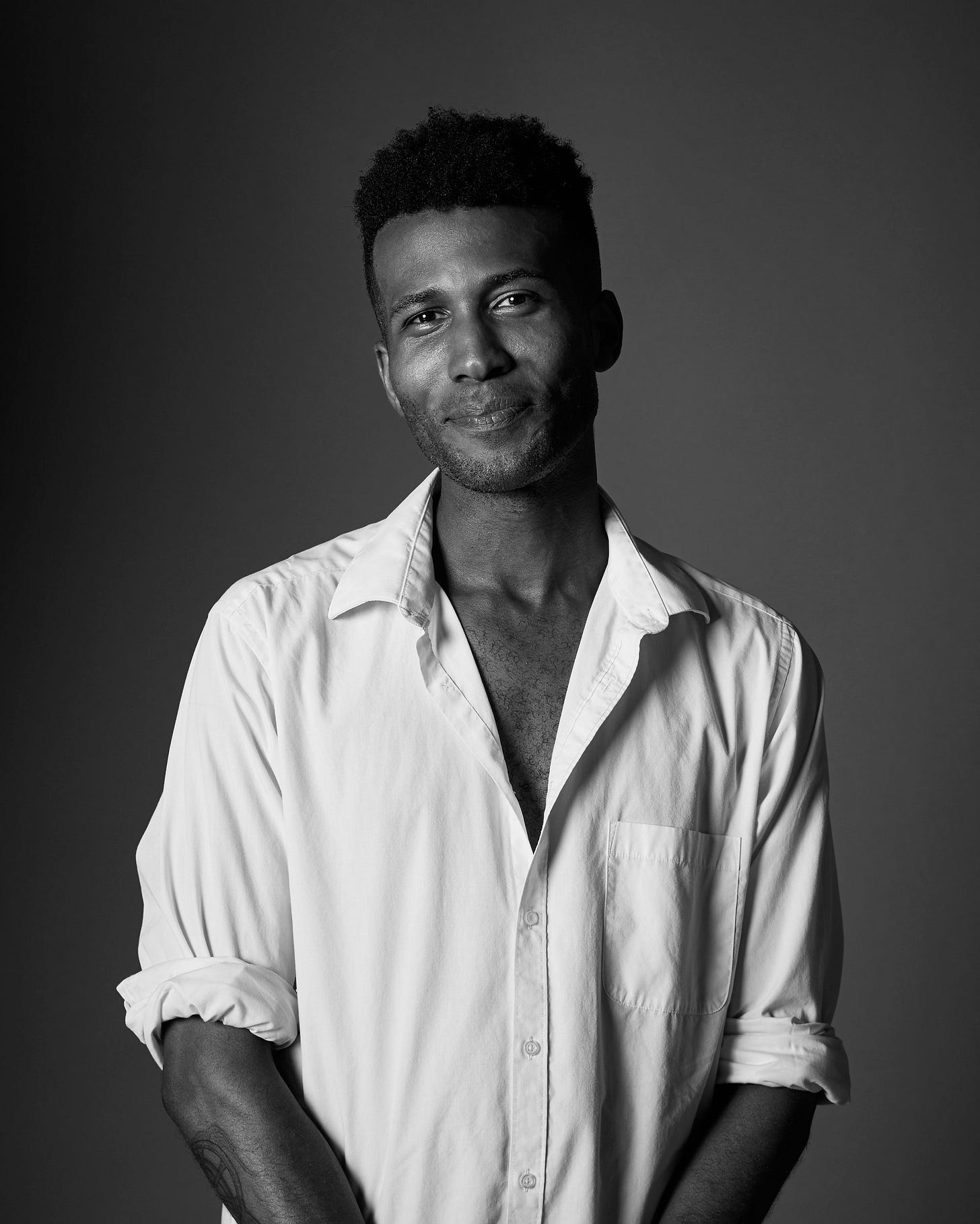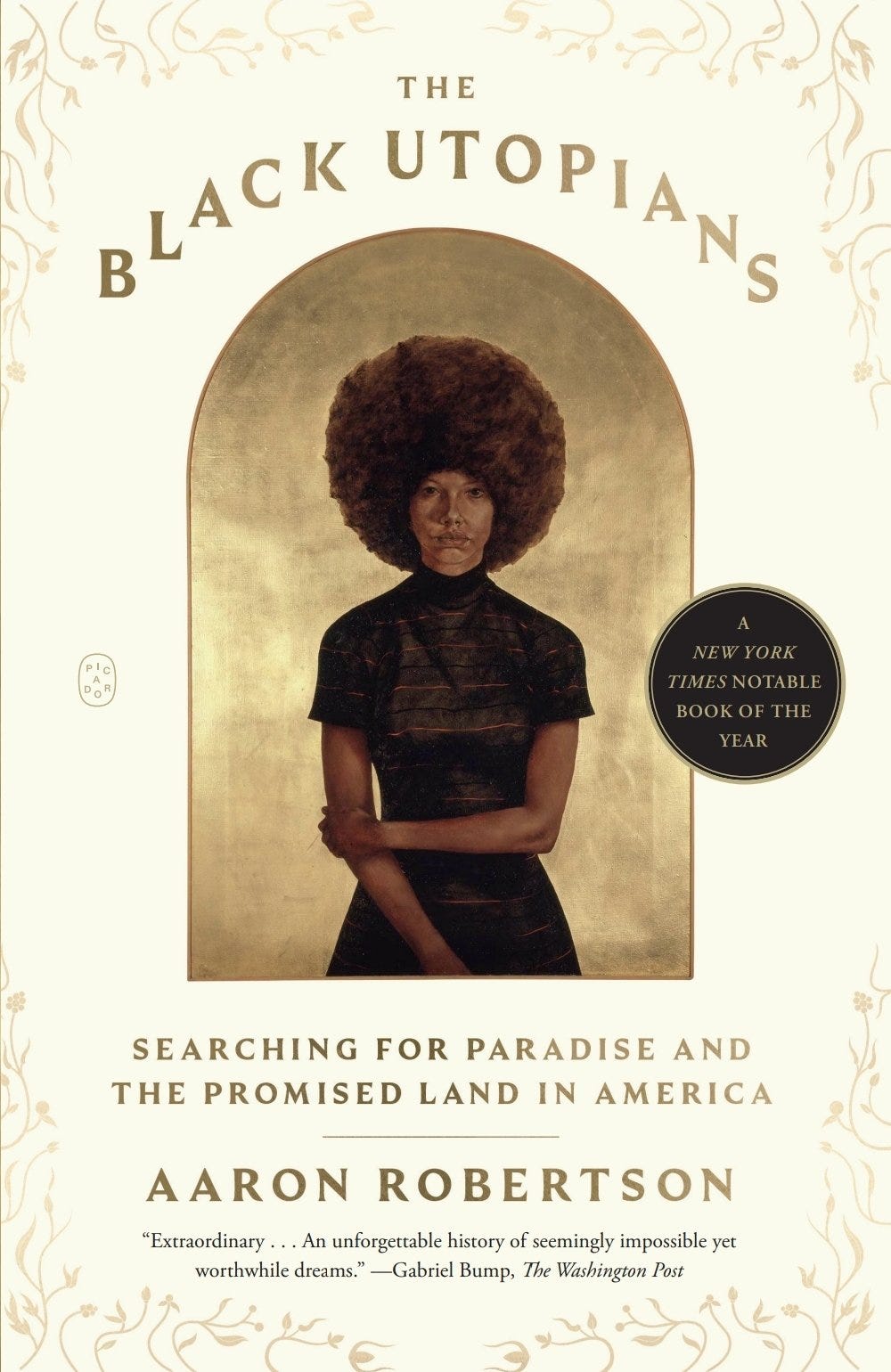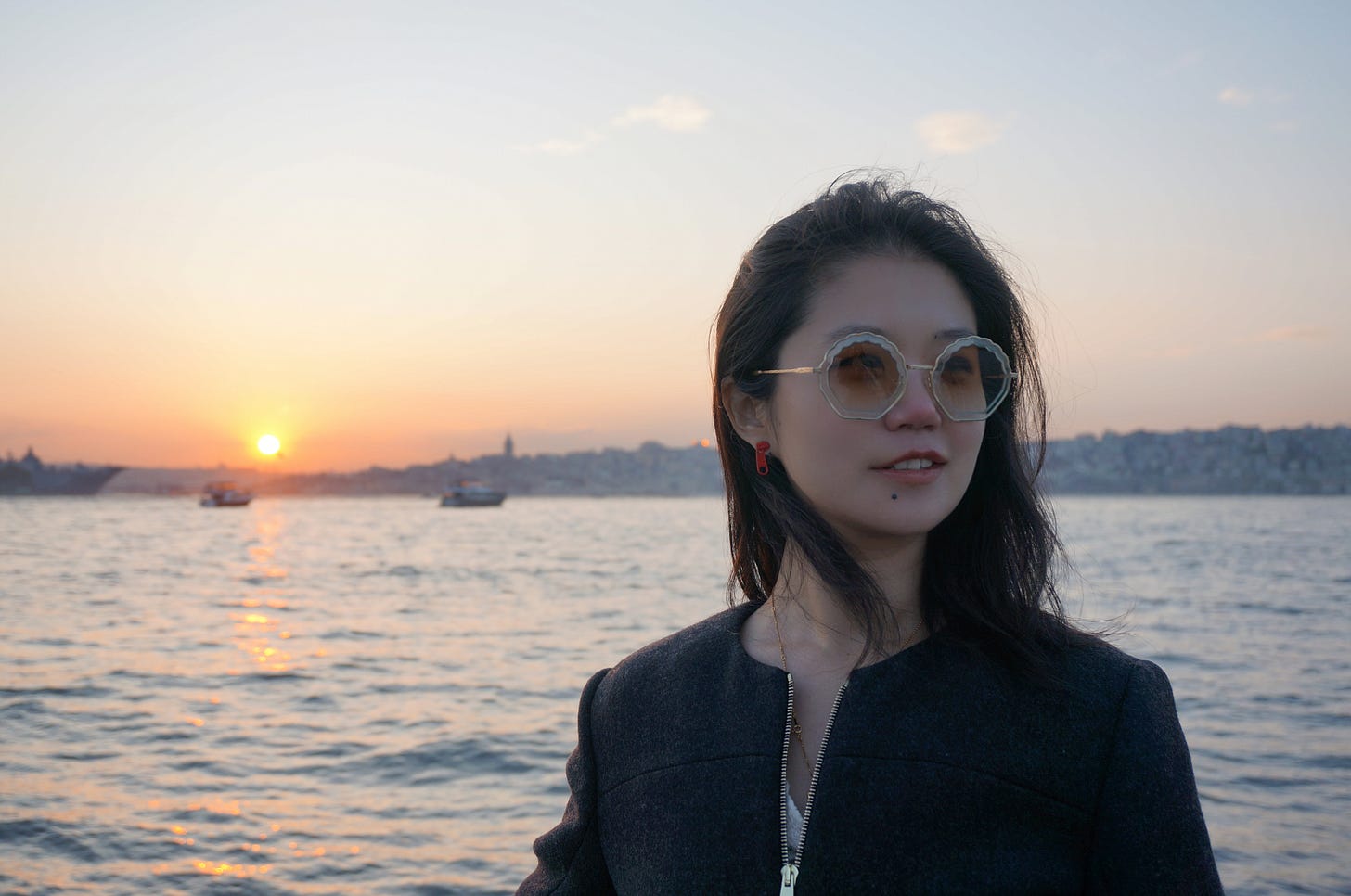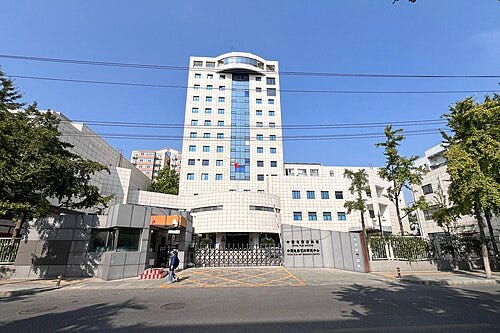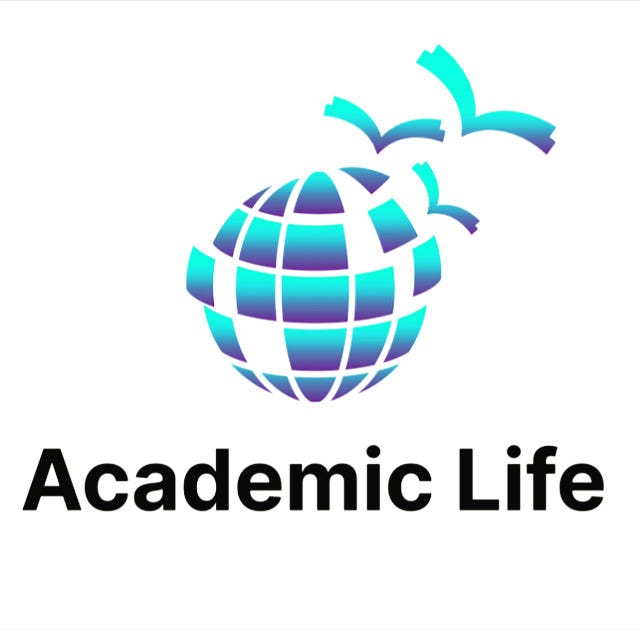“Sometimes I read the acknowledgements in a book and feel so touched, even without knowing the author personally. I keep wondering about the lived experience and stories that made that book come about.”
-Ailin Zhou
In this week’s newsletter:
Fast Five with Aaron Robertson
Meet a Host: Ailin Zhou
Graduate Students’ Corner: How to Face Uncertainty with Christina Gessler
Don’t forget to add our Live Chat to your calendar — Monday, May 19th at 1PM EDT
Join Our Live Chat with Tim Gwynn Jones
On Monday, May 19th at 1PM EDT, editor Caleb Zakarin will speak live on Substack with Tim Gwynn Jones about his incredible eight-part series, The Chair: In the Room at the Fed. Tim is a lead policy analyst at Medley Advisors and an expert on the European Central Bank. In
Fast Five with Aaron Robertson
Aaron Robertson is a writer, translator (from Italian), and editor. His most recent book, The Black Utopians: Searching for Paradise and the Promised Land in America (FSG, 2024), was a finalist for the 2024 Los Angeles Times Book Prize in History. His translation of Igiaba Scego’s novel Beyond Babylon (Two Lines Press, 2019) was shortlisted for the 2020 PEN Translation Prize, the National Translation Award, and more. He earned an A.B. from Princeton University in Italian Language and Literature, and a Master of Studies (MSt), Modern Languages from Oxford University.
Wayward Lives, Beautiful Experiments: Intimate Histories of Social Upheaval by Saidiya Hartman - No book has shaped my thinking more profoundly in the last five years than this one. Hartman’s blend of archival scholarship and speculative history was transformative for me while writing The Black Utopians. She brings a lyricism and moral urgency to historical storytelling that feels both radical and necessary. The book is a model for how to recover lives deemed unimportant by dominant histories and imbue them with complexity and care.
Two Wings to Veil My Face by Leon Forrest - This novel is a profound exploration of memory, identity, and the African American experience. Through the voice of 91-year-old Sweetie Reed, who recounts her life story to her grandson Nathaniel, Forrest delves into the complexities of family history and personal trauma. Sweetie's narratives, rich with elements of magical realism, reveal the intergenerational impacts of slavery and the struggle for self-definition. Forrest's intricate prose and layered storytelling challenge readers to confront the past's enduring influence on the present. His commitment to linguistic depth and cultural nuance serves as an inspiration for my own writing endeavors.
Texaco by Patrick Chamoiseau (translated by Rose-Myriam Réjouis and Val Vinokurov) - This novel is a monumental act of historical reclamation, told through a chorus of voices that conjure the memory of a people and place—Martinique—shaped by colonization and resistance. The storytelling is layered, digressive, and richly textured, much like oral tradition itself. As a translator, I’m also in awe of the English rendering, which captures Chamoiseau’s polyglot musicality with tremendous finesse. It’s a novel that teaches you how to listen.
The Words by Jean-Paul Sartre (translated by Bernard Frechtman) - Sartre’s memoir of childhood is sharp, unsettling, and surprisingly funny. He lays bare the performance of selfhood, especially as shaped by literature and ego, with almost surgical precision. I read this in college and found myself startled by how intimately it captured certain ambitions and anxieties I hadn’t yet found language for. It remains my favorite autobiography and a touchstone whenever I think about the risks and rewards of writing about the self.
Counternarratives by John Keene - John Keene is one of the most rigorous and daring writers working today. Counternarratives is a brilliant, genre-defying collection that reimagines histories through the eyes and voices too often erased. Each story is stylistically distinct and structurally inventive, moving from colonial Brazil to 19th-century America to the Harlem Renaissance and beyond. Keene writes with extraordinary control and vision—his work reminds me that literature can be both a form of resistance and a laboratory for possibility.
Put Aaron’s picks on your To Be Read list! You can listen to his great NBN interview and check out his new book, The Black Utopians: Searching for Paradise and the Promised Land in America.
Meet a Host: Ailin Zhou
Ailin Zhou is a second-year PhD student in Film and Digital Media at University of California, Santa Cruz. She has also worked at film festivals, museums, and galleries in both China and the United States. She joined the New Books Network in May 2024 and interviewed over 10 authors about their work in East Asian studies, film, media, feminist studies, environmental studies, and more.
Q: Can you briefly introduce yourself, including your areas of academic interest?
A: I’m doing my PhD in Film and Digital Media at UC Santa Cruz. My research interests include transnational socialist film and media, feminist and queer theories, transpacific studies, and global migration. I’m currently researching a socialist Chinese actress of Mongol ethnicity, who represented China at the 1954 Karlovy Vary Film Festival, travelled extensively in the Eastern Bloc, and also got her film broadcast in East German television. Prior to my PhD, I earned an MA in Film & Media Studies from Columbia University and a BA from Peking University in China.
Q: How did you become interested in socialist cinema, Asian diaspora, and transpacific studies?
A: I went to countless screenings at the China Film Archive in Beijing, where I was born and raised, and I watched so many Chinese and Soviet films from the 1950s and 60s—films that my parents and grandparents are familiar with. My mom could even sing the theme songs for many of them. It was this family history and memories—especially women in my family and their cinematic experiences—that really sparked my academic interest in socialist cinema. That’s probably why my research now weaves together films, archival sources, and oral histories. I like tracing individual stories behind broader socio-political movements.
Recently I’ve been watching films from the USSR, East Germany, Vietnam, and other places with shared socialist pasts. There’s something so fascinating about the utopian world these films create!
I moved to the US for graduate school during the pandemic and didn’t go back to China for three years. I didn’t really think of myself as part of a diaspora at first, but during those years away, there were moments hitting me and making me aware of what it means to be living at a distance, to be shaped by that in-between space. After moving from New York to Santa Cruz, I’d look out at the Pacific Ocean and catch myself imagining home on the other side. In the past year, I’ve flown between California, Hong Kong, and Beijing a few times, and I’ve started to really feel like a transpacific subject. That experience really got me into transpacific studies—about the complex histories within and across the Pacific, as well as film and art that have emerged from those crossings.
Q: What channels do you contribute to?
A: Mostly film, media, art, gender, and Asian/American studies, but I’ve also featured books in sociology, political science, environmental studies, and critical theory. I still feel pretty new to NBN and definitely want to branch out into more fields as I go!
Q: How did you first hear about the New Books Network?
A: It’s been a while…I honestly can’t remember because I’ve listened to so many episodes over the years! But I had a friend who became a host before me, and they interviewed scholars I really admire. I remember thinking that was so cool and I wanted to be part of these kinds of conversations.
Q: What made you want to be a host for NBN?
A: The curiosity for real-life stories and the desire to connect with and talk to the people behind the scholarship. Sometimes I read the acknowledgements in a book and feel so touched, even without knowing the author personally. I keep wondering about the lived experience and stories that made the book come about.
Q: What do you enjoy most about being an NBN host?
A: Talking to real people—again! The authors I’ve interviewed are based all over the world—from Australia and Asia to Europe and North America. It’s been exciting to connect with scholars from such diverse backgrounds. I love hearing about the challenges, adventures, and surprises they encountered along their research processes. And I always appreciate advice they’d give to grad students or early-career scholars. It reminds me that being in academia doesn’t have to be a lonely journey. There's something really powerful about building an intellectual community through curiosity, self-care, and mutual care.
It also feels so rewarding when authors or fellow hosts reach out to me, or when instructors mention they’re planning to include an NBN episode in their syllabi.
Q: Your have professional experience with film festivals, museums, and galleries. How have these opportunities outside of academia informed your approach to graduate school? And have any skills you learned been useful as an NBN host?
A: I knew I wanted to pursue a PhD probably since I was a sophomore, but I took some detours after I got my BA and MA. That said, I’ve always seen my professional experience as closely connected to my academic work, so I specifically chose a PhD program that really encourages students to bring together critical and creative practices. I’m not an artist or filmmaker (at least not yet!), but I care deeply about showcasing and promoting the work of emerging makers—especially those from marginalized groups—through my own curatorial and organizational efforts. That’s probably why I’ve always gravitated toward non-profit organizations. There’s a lot of creative and affective labor involved, grounded in care and collaboration, but not just about playing a behind-the-scenes role. Being a host on NBN feels similar in many ways. It’s about amplifying authors’ voices and helping their work reach wider audiences, which I find really meaningful.
Q: What episode has been your favorite to record?
A: All the books I’ve featured are ones I’m genuinely excited about, and I always come away from the conversations feeling inspired. If I had to pick a favorite, it would be Religion, Secularism, and Love As a Political Discourse in Modern China with Prof. Ting Guo! I enjoyed reading such a interdisciplinary book, and in our conversation, I was particularly moved by how generously Prof. Guo acknowledged the scholars who influenced her work and people she’s worked with on different projects. She made me realize that a book, or probably any academic work, is always collaborative, nurtured by dialogue, mentorship, and communal efforts. She also shared her experience of asking students to create podcasts, which was such a fun and creative approach to teaching!
Q: Other than your own, what has been your favorite episode (or channel) to listen to?
A: I enjoy listening to episodes hosted by Miranda Melcher. She’s incredibly productive, and I admire how she covers books from such a wide range of fields. I’m glad she has her own channel on NBN now.
Fun story: I was actually hoping to interview my advisor, Prof. Yiman Wang, when her book on Anna May Wong came out last year, but Miranda got to it first before I had the chance (haha!). That episode turned out to be fantastic, and I was just excited to hear such a thoughtful conversation about a book and scholar I appreciate so much.
Q: If you could record an NBN interview with anyone, who would it be?
A: I do have a long list! But I wish I could interview some non-English-speaking scholars, because their work doesn’t always get the visibility it deserves in English-language spaces. It would be interesting to experiment with bilingual or translated formats. I’m also interested in collaborating with hosts from other disciplines, maybe co-hosting some episodes to bring in more perspectives.
Q: What advice would you give to anyone interested in becoming a host at NBN?
A: Just go for it! It’s such a rewarding experience. I always find myself excited to hunt down the next book as soon as I finish recording an episode. There are also a lot of opportunities to explore and be creative, whether how you approach a topic, the kind of books you feature, or the connections you draw during the conversation.
Graduate Students Corner: How to Face Uncertainty
Dr. Christina Gessler is the creator and producer of the Academic Life podcast. She launched it in late 2020 along with the Academic Life's free books project, which has given away hundreds of new scholarly books to individuals, grassroots organizations, and Little Free Libraries coast to coast. She is a freelance editor and writing coach for projects in the humanities. You can find her at christinagessler.com.
Q: From the pandemic, to navigating controversy over protests, and now to the US government’s recent interventions in higher education, the last five years have been tough on graduate students and academics. Do you have any tips for how people can look after their well-being and prevent burnout?
A: I don't know a universal answer for caring for yourself in chaos. But I know that caring for yourself is important. Otherwise, you are treating yourself like an account - withdrawing your strength again and again. It's an ugly surprise when it runs out.
Your needs can shift hourly, daily, and seasonally. In grad school, I started keeping houseplants (Matilda, Charlie, Other Charlie, and Not Robert Plant), took ice skating lessons, and learned a bit of water coloring. When my dad was ill, I challenged myself to take a daily walk that only had to be long enough to notice one beautiful thing. Some days I went outside and immediately spotted a cloud or the sunlight on fallen leaves; other days I walked in a grief fog for an hour before I saw anything at all. Later, I joined a group for grief writers. And then a local dance class. And a meditation group. The through-line is that I hadn't done any of those things before; they hadn't been what I needed, until they became exactly what I needed. I didn't discover a talent for painting or for dancing, and the biggest takeaway from skating was how to fall (which became really helpful during my frozen research trips in New England).
I didn't set out with expectations - just the hope that I could find community and moments of joy. Finding joy, creativity, or beauty might sound impossible in times of chaos, as might rest, connection, and other acts of renewal. If you'd like to hear experts share their wisdom on this topic, try these Academic Life episodes: The Fun Habit; Meditation for the Academic Life; The Burnout Workbook; How Can Mindfulness Help; Exploring New Paths to Mental Health; Finishing Your Book When Life is A Disaster.
Q: We’ve just about wrapped up this academic job cycle. Do you have any advice for those who did not get an academic position?
A: My senior year of college, we had this party where you had to bring a rejection letter to get in. A few years ago, I randomly told the regional director of a large writing organization about that, and she liked the idea so much that she invited writers who had had a manuscript rejected to a tea party in the park. So, maybe throw one of those? It's important to find a safe way to process the situation, and to honor yourself for how much work you did to apply.
Also, I think it's important to do a self-inventory: Why did you want a job in academia? What parts of the job sounded appealing to you? What parts were you dreading? Where would you like to live? What would your life there (not your career) look like? What work schedule and what salary could support that? What behaviors and skills do you appreciate in co-workers, in a boss, in stakeholders, and in a community? If your dream job existed, what would it be? What's something people tell you that you are good at, but you dismiss about yourself? Which people over the years have shown you the way - and what did they show you? What would you do even if no one paid you - and why? When and where did you last thrive? What are five skills you strengthened or gained over the last few years? What made you shrink? If you think back to Younger You, what did you used to think you were good at (before someone talked you out of that belief)? What do you value - and why? What is something you need to prioritize? What would Future You thank you for doing? What would Younger You thank you for doing?
Are you willing to apply for an academic job in another season? If you'd like to learn more from experts, try these Academic Life episodes: Chasing Chickens; Decoding the Academic Job Market; Leaving Academia: Pursuing Life Abroad; The Good-Enough Life; Contingent Faculty and the Remaking of Higher Education; An Inside Look at the American Association of University Professors; Why did 48000 UC Workers Go On Strike?; Sharing Lessons From His Working-Class Parents.
Q: As we approach summer break, do you have any tips for grad students to stay productive over the summer while still enjoying this time off?
A: I worked and completed research in the summers. (Student-parents and caregivers won't really feel like summer is a time off, either.) The risk of that constant pace is burning out and/or getting sick. So, I think committing to small, consistent moments of low-impact fun is important - whatever takes little or no planning, and little or no money, and has no added burden to help you "make special memories." I cold bubble-bathed my way through one DC summer. I read novels that I had zero plans talk about with others (even when I loved the book). My friend Sarah and I went every Monday afternoon to do one thing we absolutely did not need to do - we watched planes take off; sat in a parking lot trying to predict when the "hot donuts" light would come on; sought out the worst hot cocoa (the winner was gritty); and played mildly broken arcade games on purpose. The point was to carve out an hour to two where we could stop seeing everything as having a point.
As for productivity - professors can be harder to reach in the summer and most study groups take a hiatus. Meeting summer deadlines requires flexibility, self-compassion, and a healthier attitude toward “procrastination” (it is your prewriting ritual or your brain warm-up routine, not a source of guilt). Here are some Academic Life episodes with experts offering productivity tips: Why A Writing Retreat Might Help; Getting From To-Do to Done; Attention Skills; Where Does Research Really Begin; Archival Etiquette; The Field Guide to Grad School; Find Your Argument.
Q: Do you have any tips for those who are at different stages of writing their dissertation? From about to begin, to dissertating now, and for those who are editing their work before submission?
A: Most grad students need more support with their dissertation than they are getting. I co-launched a dissertation group for my cohort. We set guidelines for reciprocity, feedback, mutuality, respect, meeting times and timelines. Having that helped me to write successful grants and finish my dissertation. It’s important to find (or create) that kind of small group. It's also helpful to seek out a mentor and/or an accountability partner for each stage of the dissertation. If you lack that where you are, spread your net wider (mentors don’t have to be in academia; and partners don’t have to be in your discipline), and look for free online writing meet-ups.
The Academic Life has some episodes that can also help: Get PhDone!; Subatomic Writing; The Dissertation to Book Workbook; Becoming the Writer You Already Are; The Grant Writing Guide; Managing Your Mental Health During the PhD Process; Your PhD Survival Guide; and Top Ten Struggles in Writing A Book Manuscript and What To Do About It.
Q: Are there any books (or other blogs, podcasts, media) you recommend?
A: I recommend NPR, PBS, The Conversation and the NBN.
Check out the programs and services offered at your campus or public library. It’s also a great time to read a banned book. Or listen to Karen Cox share from her newly banned book in this episode: No Common Ground: Confederate Monuments and the Ongoing Fight for Racial Justice.
Subscribe to Academic Life to hear more of Christina’s great interviews as well as her tips for graduate students and all academics!




